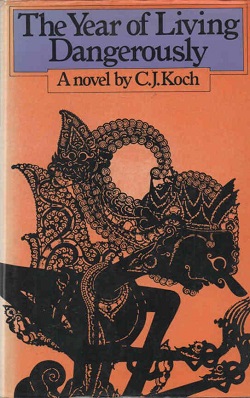Plot
The novel opens as Guy Hamilton, a foreign correspondent for the Australian Broadcasting Service, arrives in Jakarta on assignment. He meets several members of the close-knit community of British and Australians in the city, which includes journalists and diplomatic personnel. Among them is Billy Kwan, a Chinese-Australian dwarf of high intelligence and moral seriousness who is a photojournalist. Hamilton's predecessor departed Indonesia before Guy arrived, and did not introduce Hamilton to any of his news contacts. Hamilton receives only limited support from the other foreign journalists in Jakarta, who compete for information from the Sukarno government, the Indonesian Communist Party (PKI), and the Indonesian National Armed Forces. Believing Hamilton to be a moral person, Billy (who is exceptionally well-connected) helps him obtain interviews. Hamilton's reputation as a journalist soars. Billy keeps photographs and notes about the people he knows, recording his observations of their character and their lives and making up stories about their possible motivations. Hamilton is alarmed to discover that Billy is keeping a file on him, too, but decides to trust Billy anyway. Hamilton and others frequently confide in the narrator, Cookie, who intersperses the story with details from Billy's files, such as that Billy is supporting a local woman, known only as Ibu, and her children living in Jakarta's slums with food and money.
Billy introduces Hamilton to Jill Bryant, a beautiful young diplomat at the British embassy. Billy and Jill are close friends, even to the extent that Billy poses as her boyfriend so she can avoid unwanted attention, and Billy subtly manipulates events so that Hamilton and Jill continue to encounter one another. Hamilton quickly falls in love with Jill, and their relationship starts soon after a trip to the port of Priok. Hamilton also learns that Billy is a strong supporter of the Sukarno regime but is very concerned with the extreme poverty afflicting Indonesia.
Jill's diplomatic work is a cover for her real job as an intelligence officer at the British embassy. She discovers that the People's Republic of China is apparently sending a shipment of weapons to Indonesia to arm the PKI. Jill tells Hamilton this in confidence, to explain the reason for her spending time with Colonel Henderson, a British diplomat and her former lover. But Hamilton, now focused almost completely on his career, decides to verify the story and scoop the other journalists. His assistant Kumar, a PKI member, suggests they holiday in a Dutch colonial villa in the mountains, but brings along Vera, a suspected KGB officer.
Hamilton visits central Java to cover a PKI protest known as a Long March. His car is surrounded by a hostile crowd of PKI sympathizers. Although he escapes without harm, he is shaken by the close experience with death. On his journey back to Java he attends a village wayang show, a recurring plot element. At the village he encounters Vera, who later seemingly drugs him at a hotel in Bandung. Billy discovers this, and informs Jill who has become pregnant, causing her to end her relationship with Hamilton, and Billy to reject him as well.
Billy is ostracised by the other journalists after Wally, a respected correspondent, is forced to leave the country, with reasons given about his opposition to the regime and unspecified immoralities. Cookie knows about Wally's homosexuality, the rumour uncovered by officials. Billy had made a cutting comment earlier in the week about Wally's homosexuality, and some journalists suspect he revealed this to the régime, although Cookie doubts this.
Increasingly sensitive to the poverty of the average Indonesian, Billy is outraged when the child he has been supporting dies of malnutrition and disease. Deciding that Sukarno has betrayed the revolution which put him in power, Billy toys with the idea of assassinating Sukarno. When Sukarno is due to arrive at the Hotel Indonesia, where foreign journalists stay, an altercation occurs where Billy seemingly falls to his death. According to the secret police he had a pistol, and jumped from the window after unfurling a banner reading 'Sukarno Feed Your People'. Hamilton and Cookie doubt this, but prefer to not let Billy be tarnished as an assassin. Cookie rushes to Billy's bungalow in order to retrieve his files, which allow for the story to be told.
The PKI attempts a coup d'etat on 30 September 1965. Hamilton and Kumar drive to the Presidential Palace, where Hamilton attempts to gain entry by boldly walking past the guards. An Army officer strikes Hamilton in the face with his rifle butt. Badly injured, Henderson rescues Hamilton and takes him to British Embassy property. A physician tells Hamilton that he has a suspected detached retina, and must lie still for a month or risk losing sight in his eye. Hamilton tries again to convince Kumar to leave the party, but Kumar says he is fighting for a better Indonesia.
Hamilton decides to risk losing his eye, and flies to London to take up an ABS posting there, in order to meet Jill who has been posted in Singapore. She meets him on the plane, and the novel ends with them together on the way to London.
